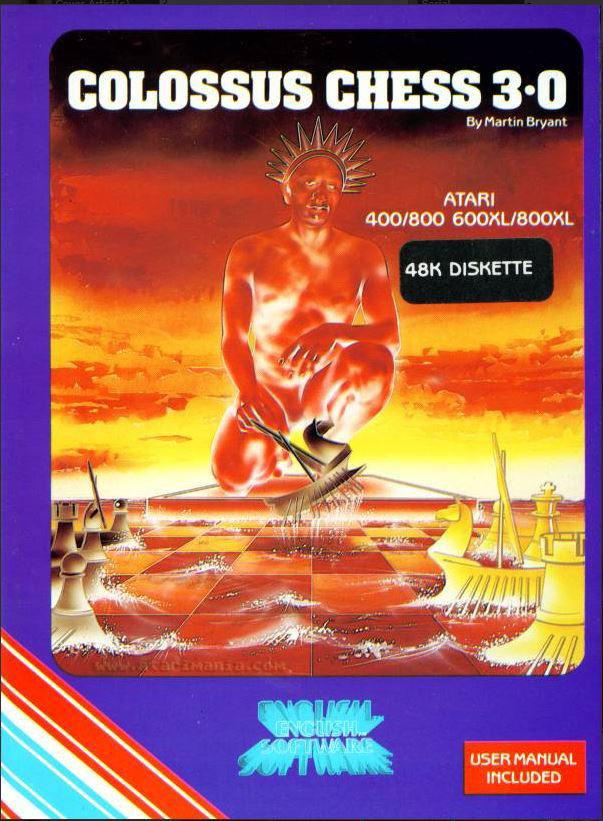
9 minute read
Cyrus (ZX SPECTRUM) VS. Colossus (ATARI 800XL
Man vs Computer and Computer vs Computer
Cyrus Chess vs Colossus Chess, or Richard Lang versus Martin Bryant. Who are these gentlemen?
Advertisement
They are two British programmers who, in the late 70s and early 80s, specialized in programming software able to play chess with enough strength to put even good ranked players into trouble. The history of many logic and electromechanical machines dedicated to the 'noble game of chess' is not recent, as it dates back to the beginning of the twentieth century.
Over time, notable names in information technology such as Von Neumann, Turing, Wiener, Zuse and Shannon have also been involved in building computers and developing specific algorithms. The challenge of beating humans at this charming game has always been an excellent application ground for mathematicians and computer scientists (see also David Levy's famous bet, who in 1968 betted that no chess computer would beat him within 10 years).
To date, the "battle" between man and machine is basically over. The machines, or rather the chess engines have prevailed over the best human players in the world for at least fifteen years. Engines developed in the traditional form have now achieved their peak and programs such as Stockfish, Houdini and Komodo easily exceed the most valued human champions by about 600 ELO points.
On paper it is actually an abyss. The current "human" world champion is the Norwegian Magnus Carlsen, followed closely by Italian American Fabiano Caruana (up to two years ago he used to play for the Italian Federation, then he joined the USA), the "U.S." players Nakamura and So, the Russians Mamedyarov, Karjakin, Kramnik and Svidler, the Indian Anand, etc.) and everyone of them has been using software engines for some years now to train themselves as well as to "learn" their style of gameplay.
For some months now in chess software industry (and more generally in strategy games) what is happening is a real Copernican revolution: the algorithm based on Artificial Intelligence called AlphaZero, developed by DeepMind, an AI company controlled by Google, not only has been able to repeatedly beat the world champion of Go, but has brilliantly defeated the best chess engine Stockfish in a challenge out of 100 games held last December 2017 (results: +28 =72 -0, that is 28 wins, 72 draws and 0 losses).

AlphaZero, in just 4 hours of training playing against himself, has "learned" to play and then smashed Stockfish v8 with 25 victories and 25 draws with the white pieces and 3 wins and 47 draws with the black pieces. An unexpected and, to say the least, sensational achievement in the world of chess engines, which breaks new barriers in AI software applied to problems similar to complex games such as chess.

Chess and home computer: the protagonists
beloved retro-computers. In the early 80s, with the advent of home computers, programmers like Lang and Bryant were hired by the emerging commercial software market to develop their successful algorithms on 8-bit machines. We can appreciate their results in two chess programs that we have selected for a match/review on these pages. Yes, we have made a little research to determine which of the two algorithms was the strongest at the time, comparing two of their best implementations: the name of White Knight, which
Cyrus Chess on Sinclair ZX Spectrum and Colossus Chess 3.0 on Atari 800XL.
Richard Lang began his career as a specialist programmer in January 1981 after thoroughly studying a book of Dan and Kathe Sprackler about one of the first algorithm named Sargon. That book even provided a source code in Assembly Z80. So Lang worked programs.
hard and found new ways to improve the theoretical scheme Sargon was based on, not only to make it faster but also to implement more advanced techniques and a more efficient system to evaluate positions reached on the chessboard.
His first release, Cyrus, won the released.
second European Chess Championship for Microcomputer held in London in September 1981, with 5 wins out of 5 games played. Lang was immediately offered a contract by Intelligent Software (which was founded by David Levy) and Cyrus Chess for ZX Spectrum was his first commercial title. Lang later moved on to port Cyrus to several platforms on behalf of Intelligent Software and in 1983 he moved on to the new Psion program for the 68000 processors, whose first release was the version for Sinclair QL.
In 1985 Lang collaborated in porting the Psion engine to the chessboard computers that, together with its software version called Chess Genius, dominated the scene of dedicated microcomputers from the mid-80s until the early 90s, winning several times the title of World Champion in its category. In 1994, Chess Genius even won a quick game (25 minutes for each side) against the then world champion Garry Kasparov. Since 2002, Lang has been managing his small company that sells Chess Genius for various platforms, PDAs and smartphones, including the Android version. Lang recently stated that even today many of his original ideas and techniques used in Cyrus still live in his current releases.
Martin Bryant began experimenting with his first chess program in 1976, released under was initially developed in Pascal and then brought to Assembly 6502 for the Apple II. His early version of the engine won the European Chess Championship for Microcomputers in 1983, a year later after Cyrus.
White Knight was released in two versions for BBC Micro and Acorn Electron and its main feature was to calculate and display the strongest variant in a given position, the so-called "Best Line" function, which later became a common feature in all chess
White Knight's algorithm was used by Bryant as a basis to develop the whole Colossus Chess series since 1983, with titles and versions for a large number of 8/16-bit platforms of the 80s, including Amiga, Atari ST and IBM PC. In 1985 the magazine Zzap!64 awarded Colossus Chess the prize of “best chess program” for the home computers. Later Bryant never stopped improving his engine and his commercial releases under the name of Colossus Chess. The latest versions date back to 2008 when "Colossus 2008b" was famous Mephisto series of
The challenge
Cyrus and Colossus are both easyto-use chess software with quite intuitive user interfaces. To start playing against the computer with White you just make the first move or access the advanced commands
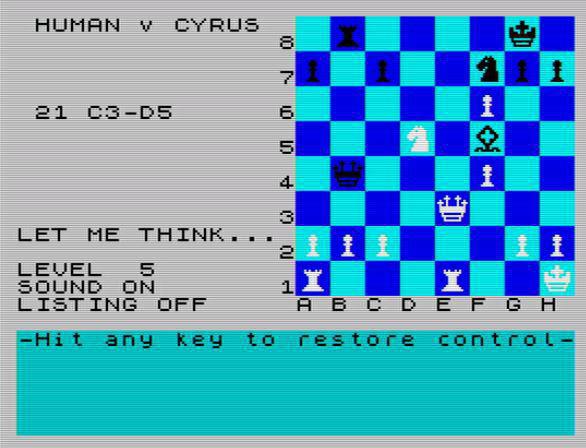
OUR FINAL SCORE
Cyrus IS Chess - Intelligent Software Ltd / Richard Lang - 1983 - ZX Spectrum 16/48K
Gameplay 75% - The user interface provides simple usage of the keyboard and the graphical representation of the chessboard is good enough to play only with the help of the screen. The game is reproduced in all its rules (enpassant, draw for repetition of moves, rule of 50 moves, playing finals, etc.). With several game levels available Cyrus is a valid opponent still today (the playing strength is estimated at around 16501750 ELO points).
Longevity 90% - For chess enthusiasts there is no end to the number of good level games that can be played on your ZX Spectrum. The engine effortlessly tackles all the most played openings and variants.
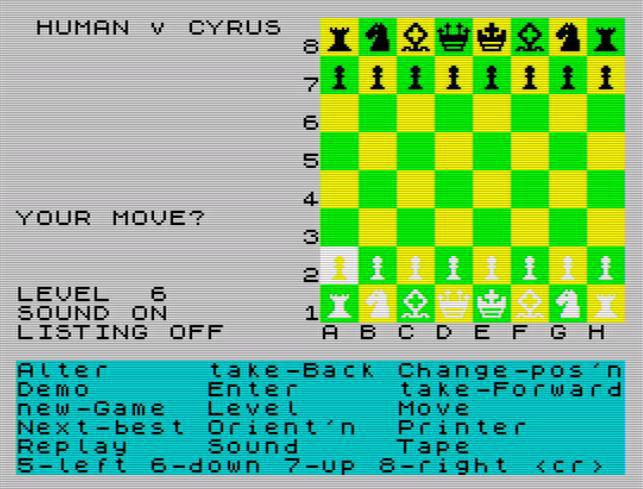

to change the level of play, play with Black, rotate the chessboard, set up a different position, customize colours and so on. To that respect, Cyrus on ZX Spectrum is more intuitive than Colossus as it always displays the game options. These commands can be accessed by pressing alphabet keys, whereas Colossus needs to press a CTRL-<key> combination to activate the game features. Both programs feature a graphical display of the chessboard that lets the user play a whole game using the screen only (at that time many players held a real chessboard next to the computer in order to replicate the played moves).
The match between the two programs was played by setting an equal game level for both of them in terms of play strength, with the same number of seconds allowed per move.
The emulators used to run both chess programs (Spectaculator and Altirra under Windows) have been set to recreate the stock conditions of the two home computers: a 48K ZX Spectrum 48K and an Atari 800XL.
The challenge was set in 6 games at a constant rate (30 seconds per move) and each software played 3 times with the white pieces and 3 times with the black pieces. Here is the outcome of the clash between these two historic chess programs: Colossus 4.5 - Cyrus 1.5 (4 wins for Colossus, 1 for Cyrus, 1 draw).
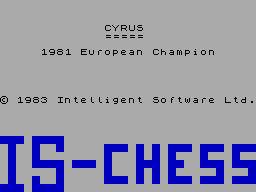
Colossus proved to be much more robust and held a good but solid style throughout the match. Cyrus got off to a good start by winning the first challenge with the white pieces but lost the next 3 matches, yet showing some original ideas when attacking its opponent and even using pure strategical tricks to stay even during the games.
Both engines diverted quite early from the canonical lines of the openings, but in the middle game Colossus' conservative technique prevailed at last. The games averagely lasted for about 40-50 moves and the only draw came for repetition of moves.
As the engines don’t feature the option to abandon a game in case of manifest inferiority of material or position, the win or the draw have been manually declared (the software which was winning would have however come to checkmate the opponent). All 6 matches of the match are available on request in PGN format.
It was fun to play and test the strenght of the programs selected for this challenge. And it's amazing to see how these little home computers, with their reduced memories, can still cope with many skilled human players, such as myself!
by David La Monaca
OUR FINAL SCORE
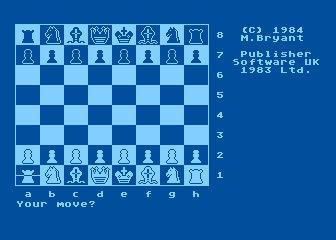
Colossus Chess 3.0 - English Software Co. UK - 1984 - Atari 400/800 XL/XE
Gameplay: 80% - The program offers a wide range of game levels, customizable to create a large number of combinations. An essential but effective representation of the chessboard allows you to check out the moves and the reached position at a glance. If you want to access the many commands available, you need to take a look at the manual. All rules of play are respected and the playing strength is around 1750-1850 ELO points.
Longevity: 90% - The same ratings expressed for Cyrus Chess are valid for Colossus. This engine was and still is a good opponent for amateur and ranked players. Surely one of the best, if not the best, chess engine for Atari and all the 8-bit machines of the 80s, very adaptable and with a high level of customization.










